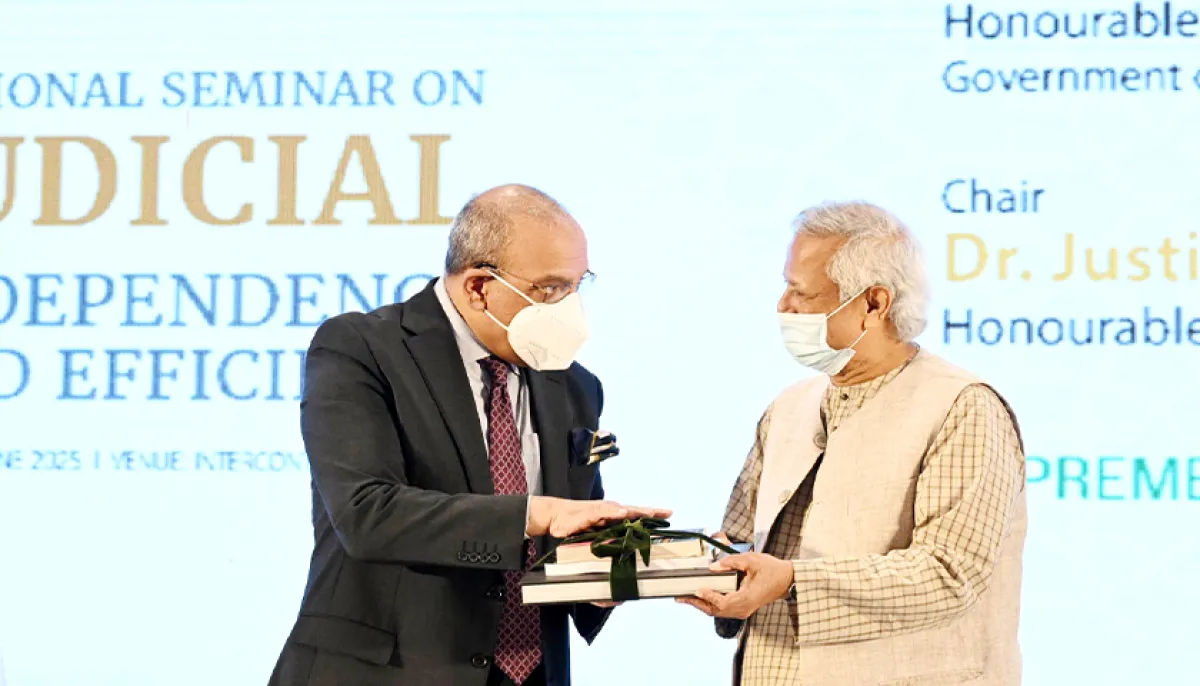
Chief Justice Syed Refaat Ahmed on Sunday iterated the urgent need for a separate judicial secretariat to ensure full administrative and financial autonomy of the judiciary.
Speaking at a national seminar on judicial independence and efficiency at Intercontinental hotel in Dhaka city, the chief justice said, ‘Justice cannot be carried forward on borrowed infrastructure or delegated authority—it must stand on its own institutional legs.’
The event organised by the Supreme Court and the UNDP had chief adviser of the interim government Professor Muhammad Yunus as chief guest. Law adviser Asif Nazrul and attorney general Md Asaduzzaman were present as special guests.
At the event, presided over by the chief justice, all three key figures—the head of the judiciary, the head of the executive, and the law adviser—voiced support for establishing the secretariat to strengthen judicial independence.
Chief adviser Yunus echoed the chief justice’s statement saying that setting up separate secretariat for judiciary was essential.
‘A separate secretariat would provide the judiciary with structural autonomy and protect it from external pressure,’ he said.
He noted that the Judicial Reform Commission’s report complemented the chief justice’s road map announced on September 21, 2024 that outlined structural, short-term and mid-term reforms.
Yunus said both the commission’s findings and the chief justice’s proposals reflected a shared goal of building an independent and accountable judiciary.
He described as a milestone the formation of the Supreme Judicial Appointment Council, tasked with appointing Supreme Court judges based on merit.
The chief adviser also said that steps were under way to build a transparent governance structure to protect the district judiciary from political interference.
Law adviser Asif Nazrul also said that the interim government was committed to creating the separate Supreme Court secretariat. ‘This is absolutely essential,’ he remarked.
He explained that placing the lower judiciary under the higher judiciary’s administrative control would reduce political interference.
However, he stressed that the higher judiciary must also be free from such interference, mentioning that the government had already promulgated an ordinance to appoint Supreme Court judges based on merit and transparency.
‘Our first step was to pass a law to remove political influence from judicial appointments,’ he said.
He also proposed several additional measures to complete the reform in the higher judiciary that included rules for confirmation of additional High Court judges, a transparent system for promoting HC judges to the Appellate Division, a code of conduct for Supreme Court judges, amendments to the Contempt of Court Act, and Rules for forming HC benches.
Chief Justice Refaat said that the judiciary had entered a transformative phase after the student-led July uprising, describing the national seminar as a ‘turning point’ in the judiciary’s institutional journey.
He said that he had not become the 25th chief justice by choice but had responded to public demand following the collapse of a compromised judiciary.
The chief justice outlined reforms to restore independence, ensure accountability, and regain public trust. He recalled unveiling the Judicial Reform Roadmap on September 21, which included proposals of a Supreme Court secretariat for administrative and financial autonomy, depoliticised guidelines for judge postings, and separate civil and criminal courts.
He said that 12 directives had already been issued to combat corruption and improve efficiency, including a nationwide digital complaint system, public helplines, and citizen redress mechanisms.
Justice Refaat said that judicial independence also required transparency in appointments and accountability at the highest level.
He also noted that two Appellate Division judges were recently appointed under the newly formed Supreme Judicial Appointment Council.
He thanked the chief adviser, law adviser and attorney general for their support in implementing these reforms.
The chief justice praised the dedication of nearly 2,000 judges and magistrates nationwide, including over 1,200 young judges aged between 24 and 35. Among them, 625 are women—making up more than 31 percent of the judiciary.
He said these judges, despite logistical and infrastructural challenges, are leading reform from the ground up.
In 36 districts, case disposal has outpaced new filings over the last ten months, he noted.
However, he acknowledged the backlog of over 4.2 million pending cases and called for continued innovation and dedication.
Justice Refaat also highlighted support from development partners including UNDP, Sweden, the EU, and the UK. He mentioned a study visit to South Africa, the launch of a judicial helpline, and the expansion of digital legal aid.
He said he had conducted reform roadshows in all eight divisions to directly engage judges, magistrates, bar leaders, and the public in the reform agenda.
Before concluding, the chief justice thanked the chief Adviser, law adviser, attorney general, Supreme Court judges, bar leaders, the judicial reform committee, and all development partners for their continued support.
Source: Newage
